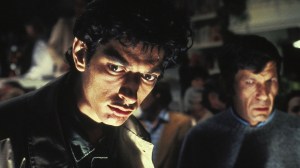After almost twenty years away from the characters, Bill and Ted Face the Music stars Keanu Reeves and Alex Winter are back in the roles this year. The film will be premiering in theaters and on demand next week, and even before seeing the film, it feels like the absolute perfect summer movie for 2020. Since 1989, the Bill and Ted franchise have followed a pair of friends whose only goal is to bring joy to themselves and others, who struggle against challenges that feel far too big for them to handle, and who, in spite of being incredibly un-self-aware, have to confront their weaknesses and inadequacies time and time again.
Videos by ComicBook.com
If that does not sound like the perfect entertainment for an America dealing with the pandemic and finally beginning to examine some of the institutions that keep racism and state violence alive and well, I don’t know what does. But, of course, Bill and Ted’s Excellent Adventure and Bill and Ted’s Bogus Journey manage to touch on these themes without ever being didactic; nobody feels like they’re being preached to when a lovable goofball says “be excellent to each other.”
Ed Solomon and Chris Matheson, along with actors Keanu Reeves and Alex Winter, have crafted a pair of lovable, relatable losers in Bill and Ted — guys you always want to root for because their brand of dopey humor and incompetence never feels malicious or takes sides. The idea that Bill and Ted are destined to unite the world through a common love for music feels utopian, but preaches little in the way of specific politics, other than an implicit message against bigotry and nativism.
In Bill and Ted Face the Music, the pair are dealing with the same themes they did in Bill and Ted’s Bogus Journey: the importance of family, the difficulty of wrestling with a destiny that’s nearly impossible to live up to, and a journey of self-discovery and self-improvement. The movie picks up in the present day, where Bill and Ted have yet to write the song that will unite the world, and the premise seems to be that they now have a ticking clock to do so before all of time and space folds in on itself when they fail.
That is, as Marty McFly might say, heavy. And, at a time when all of us (no matter how little global influence we might usually have) are being asked to step up and “save” our neighbors through simple acts like wearing a mask and practicing better hygiene, it feels more relatable than ever.
The backstory

It seems, based on recent interviews, that a big part of what makes Bill and Ted such compelling characters is the real-world friendship between writers Ed Solomon and Chris Matheson. The pair, who performed as a proto version of Bill and Ted in improv comedy before they ever wrote the screenplay, seem to genuinely love Bill and Ted, and admire the performances that Alex Winter and Keanu Reeves are giving in those roles.
Winter and Reeves have a similar friendship: as legend has it, Matheson and Solomon, having no real say over casting during the production of the first movie, were worried that the studio would mess it up, and lamented that the goofballs in front of them at a McDonald’s restaurant were exactly the type of guys who should be cast. It later turned out, those goofballs were Winter and Reeves (presumably on their way to audition for the parts). Despite an easy friendship that seemed self-evident to the writers, the pair weren’t friends already, but connected during the audition process and just became inseparable.
It’s not an entirely uncommon occurrence: in An Oral History of The Office and the Office Ladies podcast, as well as in dozens of interviews over the years, Jenna Fischer and John Krasinski have independently shared stories saying that they knew intuitively that the other person was perfect for the iconic roles they eventually landed, and took it as a good sign when they tested together.
But in a world without much human connection, seeing the genuine affection dripping off the writers and stars in interviews (and onscreen in the available clips and previous films) feels more urgently needed than ever.
The stakes
The stakes of Bill and Ted’s Excellent Adventure, as well as its two sequels, are global — rather, cosmic — in the same way Marvel and DC movies are, technically. Of course, they lack the same sense of dread that someone you love could die at any moment that those movies have, and they also (largely) lack any kind of violence.
The notion that the world could fall apart if not for the intervention of these two characters who aren’t just the everyman — aren’t EVEN the everyman — but in many ways the lowest common denominator, feels prescient in the days of COVID, a nonstop wall of hate on the news and social media, and violence in the streets.
The “villains”

In Bill and Ted’s Excellent Adventure, there is no traditional “villain.” The antagonist is, essentially, the characters’ own shortcomings, which are standing in the way of them achieving the greatness that others know they can. There’s no lurking evil hoping for the pair to fail, sabotaging their best efforts, or looking to prevent them from accomplishing their goals.
The closest you come, in fact, is Ted’s father, a strict and unforgiving police officer who can’t understand why the discipline he has tried to raise his oldest son with has never paid off. He is at first threatening, and later determined, to send Ted away to an Alaskan military academy, where his young mind can be reshaped and he can be taken away from the “bad influence” of Bill…but ultimately, none of that is out of spite or cruelty, but out of frustration, a hope for a better life for Ted…and, as revealed in the third act, a bit of transference, whereby he is seeing and reacting to his own flaws in his son.
In the third act, Ted’s father, bound and determined to send Ted away, makes his way to Bill and Ted’s history presentation and sees, both in the quality of the work and the reaction of the audience, that his son is capable of living up to his potential there in San Dimas. Once he sees the presentation, he doesn’t bring the idea of military school up again in the film.
In Bogus Journey, the story delivers a more traditional villain in DeNomolos, who leads a group of dour, jackbooted rebels who don’t like the addle-brained peace that the future has achieved by using Bill and Ted as role models. He sets out to discredit the pair and even has them killed, a challenge they overcome with surprising ease. In the end, DeNomolos is instrumental in helping Bill and Ted reach their first big audience and fulfill part of their destiny. He is also arrested by Ted’s dad, in a symbolic gesture of solidarity with his son and a sign that DeNomolos’s joyless, authoritarian vision for the future is rejected even by the “law and order” guy.
Why all of that matters
We know fairly little about the plot of Face the Music as yet, but it appears that, like Excellent Adventure, the third film has no real “antagonist” and is primarily a story about self improvement and living up to your destiny.
In a world constantly beset by petty conflicts, where you can’t go on Twitter without being mocked or harassed by people who disagree with you politically or even just don’t like the same kind of movies you do, there is something really appealing about a movie where it’s, classically speaking, “man versus nature” or “man versus self.” The lack of a cruel voice pushing back against the goodwill of the protagonists is a refreshing change of pace not only from the types of narratives that are most common in summer blockbusters — but from everyday life.
There may still be some version of an antagonist — certainly the Prison Bill and Prison Ted seen in the trailer don’t seem especially friendly — but it seems like they will be more in the vein of Death’s role in Bogus Journey — more a challenge than an antagonist.
Self-reflection

As noted in the opening of this story, one of the key elements of Bill & Ted’s Excellent Adventure and Bill & Ted’s Bogus Journey is the pair — who seem completely incapable of self-awareness — embracing their destiny and trying to make themselves better.
At the start of Bill & Ted’s Excellent Adventure, the pair discuss becoming famous by recruiting Eddie Van Halen to play guitar for their band. The general gist is a line of circular logic that says they will “never be a super band until we have Eddie Van Halen on guitar,” but that they can’t get Eddie Van Halen until they have a triumphant video, and they can’t have a triumphant video unless they have good instruments, and they can’t have good instruments if they don’t even know how to play — which is why they need Eddie Van Halen.
By the end of the film, while jamming in that same garage, Ted sits Bill down and says that maybe it’s time they started working, to learn to play and live up to what they know is expected of them.
…which pays off
In Bogus Journey, the pair propose to the princesses they met (and Rufus “rescued” away from their medieval lives) in Excellent Adventure, admitting as they do that things have not gone the way they expected in the intervening years, and that they know they need to work on that.
It seems the pair have stalled — certainly better musically, and more mature, than they were in the first movie but still largely underachieving in both areas.
But by the end of the film, they use the booth to secret themselves and the princesses away, until they are capable of blowing the roof off of a Battle of the Bands competition — complete with newborn babies at their side and having literally grown beards during their time away to study music and focus on their relationships.
Obviously, it requires extraordinary circumstances, but the people you least expect to do it find it within themselves to examine their shortcomings and work hard to overcome them. Again, it isn’t hard to strain that metaphor to include a world population that has ignored and dismissed signs of institutional racism for generations, and who spent weeks seeing its impact playing out in real time and looking back to re-evaluate their past choices as a result. Whether or not people will be able to hang onto that sense of urgency and self-awareness for long enough to affect real change is anybody’s guess at this point, but in the case of Bill and Ted, the story’s message is that anybody — even someone who seems completely unsuited to the challenge — can rise to the occasion if they need to.
Motivations

While Bill and Ted seem shallow from the beginning, they avoid something common to ’80s and ’90s movies about rock: the trappings of fame never seem to be the end goal for their music. In Excellent Adventure, they simply want to be a “super band,” seemingly because they love music and want to produce it.
In Bogus Journey, you have the “super band” thing, but compounded by their own sense of who they are destined to be, and the responsibility they have to Rufus and the future he represents. Even in the final montage at the end of the film, which features magazine covers featuring their meteoric (and largely retconned, it seems) rise to fame, the focus is always on the music (and how it betters the world), and rarely on the material goods.
This ultimately speaks to what’s appealing about Bill and Ted: like Superman, they have an inherent goodness. They may be dumb and sometimes irresponsible, but they come through when it counts and they are never malicious or self-centered. It’s the kind of goodness that can be easily dismissed given how cynical we often are, but which feels urgently needed in an increasingly selfish, mean-spirited, and chaotic world.
Sometimes, it’s good to have somebody around to remind us to be excellent to each other (and party on, dudes).








